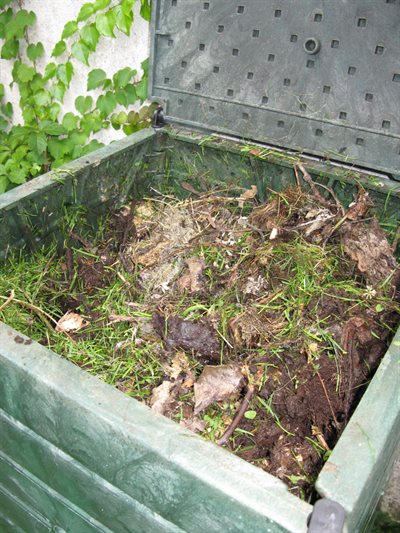Composting
Composting is always a good way to create your own organic material for use in your garden, beds, tubs and containers. It also acts as a great source of minerals and nutrients perfect for plants which have just been planted or have not yet fully established. It’s important not to use this material on its own to grow plants in as this is unlikely to work. Homemade composts should be mixed with traditional soils at a ratio of 3 to 1 - 3 traditional soils and compost, 1 homemade composted material.
So, first of all you will need a compost bin. You can build your own from scratch out of wood, buy a self-assembly flat pack  bin or a pre-formed plastic one. The ideal size is around 1 to 2 meters squared and preferably with a lid as this will help to contain the heat, accelerating the rotting process. The plastic ones are the most effective as they also conserve moisture, which again helps with the rotting process. If your bin doesn't have them already, drill some holes in the sides of the compost bin - about 1com in diameter, this will help with air flow. Don't make a compost bin from mesh or similar material as this will not be very effective.
bin or a pre-formed plastic one. The ideal size is around 1 to 2 meters squared and preferably with a lid as this will help to contain the heat, accelerating the rotting process. The plastic ones are the most effective as they also conserve moisture, which again helps with the rotting process. If your bin doesn't have them already, drill some holes in the sides of the compost bin - about 1com in diameter, this will help with air flow. Don't make a compost bin from mesh or similar material as this will not be very effective.
You can put most organic matter into your compost bin, but please don't use thick pruning’s (stems 5mm+ in diameter), nor meat or cooked foods as this will attract vermin. If you aren't bothered about the speed at which the material rots you can add leaves into the mix but do bear in mind that leaves take a lot longer to rot down then other organic material. If you’re adding grass, make sure you add it in thin layers at a time, between layers of unwanted fruit and veg.
Most materials will rot very well on their own. However, if you wish to speed up the process you can add additional nitrogen in the form of manure or fertilizers. You can also introduce worms to your new compost bin as they will help filter the material and leave more minerals and nutrients behind.
Compost Care
The natural heat generated in the compost bin will kill off any weeds and pests – worms withstanding! If the compost material begins to smell of rotten eggs or ammonia, this means there is a lack of air. If this happens turning over the material and giving it a good mix will help solve this problem, this can be heavy work so do consider asking for help if possible.
To summarise what you can compost this is a list of things that are quick to compost, things that are slow to compost and things that are not ok to compost.
| Quick to compost: | Slow to compost: | Do not compost: |
|---|
| Grass cuttings (thin layer) |
Thick layers of grass |
Meat and dairy products |
| Fruit and Veg |
Crushed egg/peanut shells |
Cooking Oil |
| Tea bags |
Crushed egg/peanut shells |
Rice |
| Coffee grounds and filter paper |
Leaves |
Diseased Plants |
| Bedding plants |
Egg/cereal boxes |
Seeds |
| Weeds (not with seeds) |
Small pruning’s (5mm or below) |
Treated wood chippings or sawdust |
| Manure |
Straw and hay |
Large pruning’s (6mm or more) |
| Food scraps (Uncooked) |
Wool |
Dog/Cat waste |
| Stale/mouldy bread |
Shredded paper |
Ash |
| Tumble dryer lint |
Shredded paper |
Personal hygiene products |
| |
Thin cardboard |
|
| |
Feathers |
|